|
Fantastic Korea and the Bucheon Crisis
[pt]
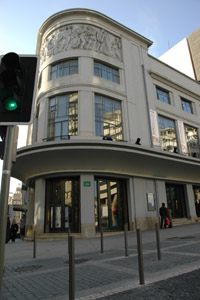 |
The Rivoli Theatre in Oporto, home to the Fantasporto Film Festival. |
In March, 5th, following an invitation from the Embassy of the Republic of Korea in Portugal, we had a meeting with South Korean film-makers which were in Portugal to participate in Fantasporto - Oporto's International Film Festival. Unfortunately in this last day of the festival Park Heung-sik («My Mother, the Mermaid») and Min Byeong-cheon («Natural City»), had already returned to South Korea. The meeting took place during lunch on a Chinese restaurant not very far from the Rivoli Theatre, where Fantasporto is based since 1998. Chance would dictate that of the two directors that won prizes – Park's film got the Grand Prix of the Orient Express Section and Min's, competing in the Official Section Fantasy Cinema, won Best Special Effects – were the ones that had left and wouldn't be able to be at the closing ceremony.
At the table were Creta Kim and Ellen Kim (ex-Programmers of the PiFan), Yang Yun-ho (director of «Fighter in the Wind», and Zeong Cho-sin (current Program Director of the PiFan)
I – PiFan
The Fall of Bucheon
The absence of directors Park and Min had a first effect: the main focus being on the issue PiFan during the meeting. The Bucheon International Fantastic Film Festival (1) is currently amidst a serious crisis, born a few months after the election of the new City Mayor, Hong Geon-pyo, who decided to replace the programming team. The situation might seem odd, justifying an explanation on the formal organization of the event. In Portugal it's normal to have names of mayors, members of the cabinet or even the President of the Republic's associated with cultural events, but their presence appears on a mere “honorific” level. What we – and I don't mean only Portuguese citizens – expect from the politics is for they to create conditions or contribute financially so that culture may be accessed by citizens; we don't expect them to interfere in running projects risking its continuity, without providing any glimpse of a rationality behind their actions.
Mr. Hong became President of the Organizing Committee of the PiFan automatically and decided to use his power and, especially, his influence, to remove Kim Hong-jun (2), the festival's Executive Director since 2001, from his office by the end of December 2004 – an attitude which was considered by many as a clear abuse of the political power over the management of a (supposedly) independent cultural entity. Not very long time passed until the three programmers, which have been receiving continuous high praises for the work they've been developing, Ellen Kim Yeong-deok, Creta Kim Do-hye and Michelle Son So-yeong, were also fired.
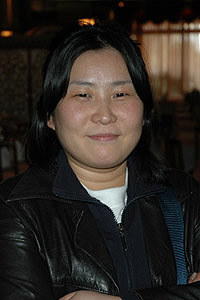 |
Ellen Kim was a member of the Orient Express Jury at Fantasporto. |
Before the Mayor formalized his decision there were already protests from some of the most influent names amidst Korean cinema, including director's Park Chan-uk, Bong Jun-ho and Kim Ji-wun, and actors Choi Min-sik and Sol Gyeong-gu, which decided to boycott a festival not run by the same team. This strong pressure made Kim Hong-jun's substitute, Jung Hong-taek, to resign. The position was not filled since then and the responsibility for trying to put the festival in its tracks fell in the hands of the new Program Director, Zeong Cho-sin - director of «Jakarta» and the box-office hits «Wet Dreams» (3).
Why did Mayor Hong want to remove Kim from his position? The official reason was the "concern" with the impossibility of the festival director to cumulate the job with his recently appointment as Head of the School of Film, TV and Multimedia at the Korea National University of Arts. Ellen Kim supplied other details, stating the Mayor considered that Kim was disrespectful to him and to all the people of Bucheon, when he forgot his name – hesitating for some seconds –, during the opening ceremony of the PiFan, in 2004. How many seconds exactly wasn't possibly to figure out. The minimum time for pausing before such an hesitation is considered an insult by the Mayor is also unknown.
"A lot of people accumulate jobs", said Ellen Kim. "The municipality contributes with 25% of the festival's budget. The Mayor – whose relation with the festival is automatic –, abused his powers to force a position in the organizing committee, winning a vote that removed the programming team." "As a cultural event, the PiFan should be independent from politics", added Creta Kim. "A lot of voices come up from all over the world protesting to this situation, but the Mayor has been refusing to hear them."
What reasons could Mr. Hong have to remove a winning team if not motivated by a desire to implement “editorial changes”? The festival is known by its risqué programming, not excluding a certain level of healthy provocation. There are a lot of taboos in South Korea and an effective censorship system (not unfamiliar to Europe, just check the ridiculous work of the BBFC in the UK, in spite of being gradually "opening"). The PiFan showed regularly films that could not be part of commercial exhibition without censorship cuts. In the edition of 2004 there was a retrospective with the films of independent US company Troma and another one colourfully titled “Corpse Fucking Art: The Films of Jorg Buttgereit”. It's not hard to imagine the appreciation of those kinds of works by the conservative politicians.
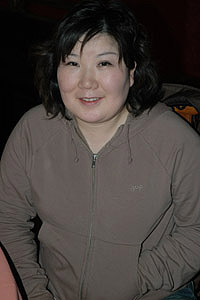 |
Creta Kim was part of the International Jury of Fantasporto. |
The current situation could hardly get worse. The new Program Director, Zeong Cho-sin (4) showed concern, but said he still haven't got the opportunity to weighten the full extension of the work he has in hands. If there was any tension between Ellen Kim, Creta Kim and Zeong it wasn't clearly spotted, at least until Ellen mentioned the birth of a new film festival in the fantastic genre that the old team was willing to do in Seoul, taking with them "the spirit of PiFan".
When I asked Mr. Zeong what he thought of the fact that Ellen and Creta (5) where determined to take the "spirit" of the festival a few miles southeast, to the capital, his answer revealed a great level of cordiality to his competitors, which – one could have thought – might not fell entirely at ease sharing the same table with him. "There's no problem at all", he said with no hesitation, "the Spirit of Bucheon doesn't belong to me." Zeong added that he considers to talk with the directors and to try to move them from their position, allowing their films to be shown. But that seems to be virtually impossible because, as Creta Kim mentioned, the Korean Producer's Association has declared a boycott to the festival. In consequence, no Korean film can be projected at the PiFan.
"I concede that what the Mayor did was not right", the current Program Director of the festival said. "It's a very complex situation and I don't have any right in trying to prevent them to create another similar event. I still didn't have the opportunity to analyse the situation adequately, but when it will be clear that the stand-still is impossible to be solved, I'll have to meet the Mayor and tell him that the solution for this problem is solely in his hands."
The Gastronomy Festival
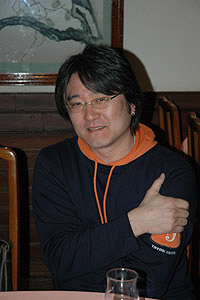 |
Zeong Cho-sin, Program Director of a festival in crisis. |
Before talking with the PiFan ex-programmers I had heard quite an interesting piece of news: the Bucheon Festival would be converted into a gastronomy event. If we make an online research we'll find a lot of references to the PiFan situation in several languages. There's also a considerable number of letters of protest signed by people of varied locations and in those texts the complaints are also against what the Mayor intends to do with the PiFan – something that varies, but which doesn't exactly gets to a Gastronomy Festival. It's actually not meant to be taken literally – a metaphor, let's call it – but it shows that the improbable is not that hard to accept. It's a brilliant – delicious, one could say – disinformation manoeuvre.
By the time I'm writing these lines it's hard to tell if the 9th edition of the PiFan will take place, but it seems to be a fact that if Mayor Hong Geon-pyo isn't able to find a bit of plain common-sense and starts using it, the event will vanish – at least for now. I don't think it's unrealistic to expect the political power to open its eyes, coming to understand that it can not force its will based on any whim or because they don't like someone, mining a film festival with the local and international reputation that the PiFan was able to build over the years, thanks to the work of a group of specialists with skills recognized over several continents. And what about replacing the Mayor instead – is it possible?
II – Fighter in the Wind
Fantastic vs. Mainstream
Bucheon was the main focus of the meeting but there was also time to talk about fantastic/fantasy and martial arts cinema, thanks mainly to the presence of director Yang Yun-ho, whose «Baram-ui Paiteo» [«Fighter in the Wind»] was in the Orient Express Section of Fantasporto.
Yang wasn't sure that his film was "adequate" for a fantastic film festival, but I stressed that in current days – actually, since 1991, when a "director's week" was introduced to diversify the choices of films offered to the audience – the event highlights a main core of films which are labelled that way due to their themes or genre, which form the main competitive section, but allows virtually all types of movies. In fact, this year wasn't the first time that the generalist section Premiere & Panorama had more titles than the Official Section Fantasy Cinema.
Unfortunately, I wasn't able to watch «Fight in the Wind», which was shown in the middle of the week – I went to Oporto both weekends of the festival, but had to come back in between. That naturally limited possibilities in what concerns choosing some questions to ask director Yang, and the tendency for generalisation based on some of the things that have been written about the film arose. This had good chances of not going too well, as I was able to confirm when asking about the alleged inspiration on the structures of the Hong Kong martial arts cinema – something that had the risk of sounding like a cliché produced by someone distant and with very few references on the cinematographies in discussion. Yang did deny any direct influence and Creta Kim added that the structure in the origin of the question – inexperienced youth faces the murder of his family/wife/master, retreats to train, learns new techniques, returns later and leaves his enemies in a pool of blood – is not typical from Hong Kong martial arts but a universal template instead. A bit later I was suggested to visit the Pyongyang Film Festival, but I'm not sure if it had anything to do with such a question.
In the 60's there was a golden period for the Hong Kong action films, but influences didn't travel one-way only, as we can confirm by the number of films co-produced by Shaw Brothers and South Korean studios. Ellen Kim mentioned that in recent years Shaw Brothers films have been regular in Korean film festivals and that Busan presented a selection with the previously mentioned co-productions, with Sammo Hung Kam-bo as an invitee.
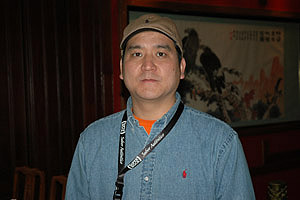 |
«Fighter in the Wind» director, Yang Yun-ho. |
"When, in the 90's, there was a return to producing action films in South Korea that didn't happen under the influence of Hong Kong cinema", said Yang. "It's natural that in an initial phase some similarities would be found in action, gangster or other genre films, with what's done in Hong Kong or Hollywood. But all this is quite new for Korean cinema; the same techniques might be used, but it's not a case of imitation or direct inspiration. There's a more expressive influence of Hong Kong cinema in Korean produced comedy."
Nacionalism or Cultural Identity
«Fighter in the Wind» is based on the true life story of Choi Bae-dal, a Korean who travelled to Japan by the end of World War II intending to become a fighter pilot, but would attain fame as a karate fighter instead, under the Japanese name of Masutsu Oyama. Popular comic book stories on the life and deeds of Choi were directly used to build the script.
Considering the most successful titles at the South Korean box-office(6) it seemed appropriate to ask the director if he'd expected «Fighter in the Wind» to work well with audiences due to its subject matter concerning the Korean cultural identity. Yang not only denied it but also said he had some fear the film would in fact fail at the box-office, considering the bad results of another recent film with a similar theme – «Rikidozan».
But the identity of Choi as a Korean which was successful in Japan was of vital importance to the director when creating the film. “In Japan he's known as Japanese. I wanted to make very clear that Choi was a Korean.”
The relevance of this desire should be understood under the light of Korean History of the 20th Century, with the country annexed by Japan until 1945.
A parallel was made with another Korean name which had to be saved from Japanese phonetics: Song Gi-jeong. Son won the Marathon in the Berlin Olympic Games in 1936, and the bronze medal was also to a Korean national: Nam Seong-ryong (7). Since Korea was occupied, Son and Nam had to run under the Japanese flag and hear the Japanese national anthem at the podium; their names were also registered with Japanese romanization: Kitei Son and Shoryu Nam.
“I pondered a lot on a philosophical question, in what concerns the film's point-of-view; if it should be clearly anti-Japanese”, continued Yang. “Choi Bae-dal wasn't exactly a resistant against Japanese imperialism. I ended up following a more positive way which isn't anti but overcoming the conflict.”
In spite of its concerns with History, «Fighter in the Wind» was made to fill theatres. “The comic books are very well-known in South Korea, hence there was a concern in using them to start developing the script.”, explained the director. “With that source as reference, I did historical research for two years, taking care that the film would end up relatively faithful to Choi Bae-dal's biography. He was indeed an individual who lived a very unique live… The basic narrative elements are faithful to reality. After that we fictionalize a script which would be able to communicate with the audience.”
Another concern of director Yang Yun-ho was the way the film was shot, namely the martial arts sequences, which respected the real techniques – this meant wires weren't used to enhance the actors or martial artists performances.
Blockbuster vs. Director's Film
In 2004, during the Udine Asian Film Festival, there was a certain concern showed in relation with the constant growing of Korean film's budgets. The will to do “bigger” films, to compete with Hollywood blockbusters, seems to be a reality and that could mean a serious blow against the diversity of South Korean cinema, because a “big” film could absorb the available budget for ten low budget films. To Kang Je-kyu, the director of «Swiri» and «Taegeukgi», this seemed to be a clear cause-consequence relation, which took him even to lament the fact that films like those he's been making could be responsible to prevent smaller films to remain unproduced.
Yang Yun-ho and Zeong Cho-sin didn't acknowledge the danger of blockbusters smothering smaller films. To Zeong – who associates the Korean blockbuster to the names of Kang Je-gyu and Kang Wu-seok, with art-house lower budget films of someone like Kim Ki-duk on the other end of the spectrum – “the two types of cinema can coexist peacefully. The situation is the same everywhere. I spoke recently during the festival with an American director which said the same thing concerning the way things work in the US.”
The current Program Director of PiFan assumed it would also be the same in Portugal, but I had to reply saying that the term “blockbuster” would hardly be used here and that the Portuguese film that did best at the box-office in 2004 went over the amazing number of 40 thousand tickets sold. Director Zeong's initial expression seemed to be asking if I wasn't using some irregular numeric system, but the reaction is only natural when we think that in South Korea some national films have crossed the 10 million tickets mark, i.e., a number which is, roundly, the whole population of Portugal. The proportion is disconcerting: in one country there are local films seen by more than 20% of the population, in another the value stops at around 0.4%.
__________
|
Cinedie Asia thanks the availability and amiability of all present at this meeting: Ellen Kim 김영덕, Creta Kim 김도혜, Yang Yun-ho 양윤호 and Zeong Cho-sin 정초신; to Hanna Lee 이한나, for Korean-Portuguese translation; to the Consul Sá Pereira, for his hospitality. Special thanks to Professor Kang Byung-goo 강병구.
This work wouldn't have been made possible without the inestimable support of the Embassy of the Republic of Korea in Portugal.. |
(1) PiFan is the contraction of Puchon International Fantastic Film Festival. The new romanization rules changed the official registry of the city's name for Bucheon [부천].
(2) Kim Hong-jun was in Fantasporto back in 1999, as a member of the jury of the Fantasia Section (which only occurred for two editions of the festival).
(3) In the 2005 box-office top 10 for Korean films, the sequel «Wet Dreams 2» was number four, with almost 1 million and 200 thousand tickets sold.
(4) The surname is alternatively written as Jeong ou Jung. Jeong is what the new romanization rules would indicate.
(5) Not related; Kim is a very common surname.
(6) «J.S.A.», «Swiri», «2009 - Lost Memories», «Taegeukgi», for instance, were all based on recent history, cultural identity and tensions with North Korea and Japan.
(7) To read more on Son Ki-jeong see the official site of the Olympic Movement.
25/03/05 |

